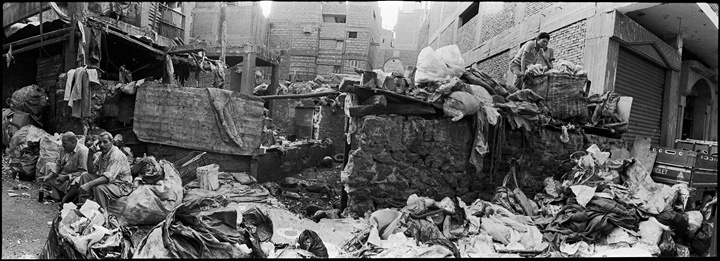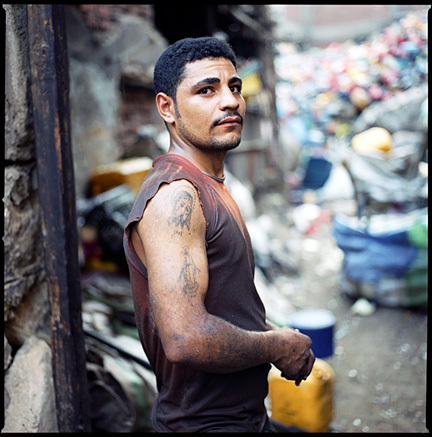Tens of thousands of people living in heaps of steaming trash in Cairo are quietly cleaning the city far better than Egyptian sanitation services could ever dream.
They are known as the "Zabaleen" (Arabic for garbage collectors) and they earn a living sorting and recycling the majority of Cairo's 10,000 pounds of fresh daily refuse.
Together with their families, they live and work in filthy, hazardous conditions, contending with the severe pollution of Africa's most populated city. Blow your nose after a few hours in their neighborhood, "garbage city," and the tissue will turn black.
Though the situation may seem disorganized and desperate, it's actually efficient and profitable, and provides a regular income for more than 50,000 poor Cairenes.
"They're full of life and charm," said Samuel Allison over the phone. A former Cairo resident and photojournalist, Allison says "without them the whole city would collapse into medieval squalor."
Sadly, the government has been trying to disperse these unsightly communities for years, ignoring the Zabaleen's interests and overlooking both the environmental benefits of the industry and the potential for development. The unnecessary pig cull this past spring was only the most recent example of their misguided and short-sighted strategies to shut them down.
Six days a week the Zabaleen meticulously organize the city's trash into metals, plastics, glass, textiles, biodegradables, etc. They then sell their harvests for a small profit to a variety of manufacturers who either re-purpose the ingredients or export them as recycled raw material.
For example, a plastic water bottle collected by the Zabaleen might end up as part of dry cleaning hanger in Cairo or a sheet of recycled plastic being shipped to China for use in a factory.
According to New Scientist magazine, the efficiency rate of the Zabaleen is almost 85%, rivaling the best of Western urban recycling models.
Pollution in Cairo is extreme, inflicting roughly $2.5 billion worth of damage to the Egyptian economy annually, according to the World Bank (compare that to $1.5 billion in annual aid from the United States). Any such grassroots green activities should incentivize the community, and not hamper it.
In April the government ordered the slaughter of 300,000 pigs, putting thousands of Zabaleen out of work. Pig farming has become an integral part of the Zabaleen recycling system, as the pigs consume the organic waste that comes in.
"They destroyed our income," said Umm Gerges, a 37-year-old Zabaleen mother, as quoted in the London Times. "Since the cull we don't have any work. We just sit around and don't know what to do."
When the cull was first ordered the Egyptian government blamed it on the threat of swine flu (though there have been no known cases of animal to human transfer of the virus), but shortly afterward they changed their statement, saying the mass-slaughter was intended as a public health measure.
"We know from the scientific point of view that we don't have a real threat from the pigs now...the government was really responding to the recommendation of [a government committee] in 2006. So the decision was taken to slaughter them now, get rid of the current population of pigs and then, in parallel, to build new farms in a desert area [away from the population]."
--Ministry of Health spokesman Dr. Abdel Rahman Shahin, as quoted in Business Today Egypt.
"The government has taken the wrong slant," said Andrew Kraczkiewicz a program officer for a non-profit development agency, formerly based in Cairo. "Instead of trying to support the safe development of this system that works fairly well, they've tried to marginalize them and push them out of business."
Now the Zabaleen are forced to ferry their organic waste nearly 60 miles outside to an Italian-owned processing plant. The new system is burdensome, unaffordable and less-efficient than the old one.
For years already the state has experimented with wiping out the Zabaleen, but there is widespread disagreement over why. Some say they are targeting the Zabaleen because they're Christian minorities, while others argue they are catering to foreign business interests. Still fewer seem convinced they're intending to tackle a public health problem.
"It's unclear what's motivating the government's decision to overhaul the system...a botched response to problems is not shocking" explained Hani Sabra, a Middle East analyst at Euraisa Group, via e-mail.
Curiously the group with the most impact on the situation appears to be the Cairo Beautification Committee. In 2005 they helped award contracts to European-owned waste companies to take over Cairo's garbage collection.
"They wanted to replace them with this modern, Western-style system and it just basically didn't work," said Kraczkiewicz, explaining that the Spanish and Italian systems were ill-equipped to deal with the water-heavy biodegradable Egyptian trash. "It was a technical failure."
The government also sneakily tacked on a new tax for this garbage service on to residents' electricity bills. The Zabaleen provide trash pick-up across the city for little or no-fee.
Instead of rashly imposing quick fixes to deal with these long-term challenges the city should work with the Zabaleen to develop a sustainable and safer sanitation business. Already schools have been built to educate and train Zabaleen children, but much more remains to be done to improve health conditions. If successful the model could help create "green jobs" in developing countries around the world.

